Updating the Climate Big Picture
Posted on 23 December 2011 by dana1981
When discussing climate science and looking at individual pieces of evidence and common myths, it's easy to lose sight of the forest for the trees. That's why The Big Picture is one of the pages featured prominently on the Skeptical Science homepage. However, we created that page over a year ago, so it's worthwhile to once again step back and take stock of what we know and what remains uncertain, and update the Big Picture.
The Earth is Warming
We know the planet is warming from surface temperature stations and satellites measuring the temperature of the Earth's surface and lower atmosphere. We also have various tools which have measured the warming of the Earth's oceans. Satellites have measured an energy imbalance at the top of the Earth's atmosphere. Glaciers, sea ice, and ice sheets are all receding. Sea levels are rising. Spring is arriving sooner each year. There's simply no doubt - the planet is warming (Figure 1).
Figure 1: Indicators of a warming world
Global Warming Continues
And yes, the warming is continuing. The 2000s were hotter than the 1990s, which were hotter than the 1980s, which were hotter than the 1970s. 2010 tied for the hottest year on record. The 12-month running average global temperature broke the record three times in 2010, according to NASA Goddard Institute for Space Studies (GISS) data. Sea levels are still rising, ice is still receding, spring is still coming earlier, there's still a planetary energy imbalance, etc. etc.
Contrary to what some would like us to believe, the planet has not magically stopped warming. Those who argue otherwise are confusing short-term noise with long-term global warming (Figure 2).
Figure 2: Berkeley Earth Surface Temperature (BEST) land-only surface temperature data (green) with linear trends applied to the timeframes 1973 to 1980, 1980 to 1988, 1988 to 1995, 1995 to 2001, 1998 to 2005, 2002 to 2010 (blue), and 1973 to 2010 (red).
Foster and Rahmstorf (2011) showed that when we filter out the short-term effects of the sun, volcanoes, and El Niño cycles, the underlying man-made global warming trend becomes even more clear (Figure 3).
Figure 3: Temperature data (with a 12-month running average) before and after the short-term factor removal
For as much as atmospheric temperatures are rising, the amount of energy being absorbed by the planet is even more striking when one looks into the deep oceans and the change in the global heat content (Figure 4).
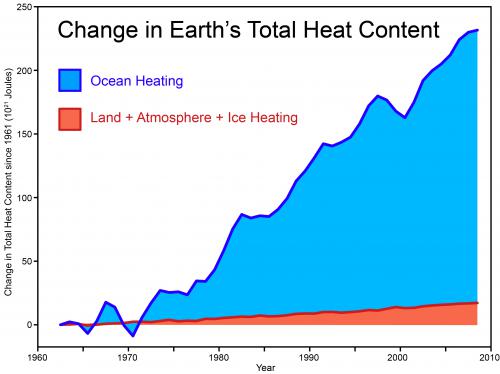
Figure 4: Total global heat content. Data from Church et al 2011
Humans are Increasing Atmospheric Greenhouse Gases
The amount of greenhouse gases in the atmosphere - particularly carbon dioxide (CO2) - has been rising steadily over the past 150 years. There are a number of lines of evidence which clearly demonstrate that this increase is due to human activities, primarily burning fossil fuels.
The most direct of evidence involves simple accounting. Humans are currently emitting approximately 30 billion tons of CO2 per year, and the amount in the atmosphere is increasing by about 15 billion tons per year. Our emissions have to go somewhere - half goes into the atmosphere, while the other half is absorbed by the oceans (which is causing another major problem - ocean acidification).
We also know the atmospheric increase is from burning fossil fuels because of the isotopic signature of the carbon in the atmosphere. Carbon comes in three different isotopes, and plants have a preference for the lighter isotopes. So if the fraction of lighter carbon isotopes in the atmosphere is increasing, we know the increase is due to burning plants and fossil fuels, and that is what scientists observe.
The fact that humans are responsible for the increase in atmospheric CO2 is settled science. The evidence is clear-cut.
Human Greenhouse Gases are Causing Global Warming
There is overwhelming evidence that humans are the dominant cause of the recent global warming, mainly due to our greenhouse gas emissions. Based on fundamental physics and math, we can quantify the amount of warming human activity is causing, and verify that we're responsible for essentially all of the global warming over the past 3 decades. The aforementioned Foster and Rahmstorf (2011) found a 0.16°C per decade warming trend since 1979 after filtering out the short-term noise.
In fact we expect human greenhouse gas emissions to cause more warming than we've thus far seen, due to the thermal inertia of the oceans (the time it takes to heat them). Human aerosol emissions are also offsetting a significant amount of the warming by causing global dimming. Huber and Knutti (2011) found that human greenhouse gas emissions have caused 66% more global warming than has been observed since the 1950s, because the cooling effect of human aerosol emissions have offset about 44% of that warming. They found that overall, human effects are responsible for approximately 100% of the observed global warming over the past 60 years (Figure 5).
Figure 5: Contributions of individual forcing agents to the total change in the decadal average temperature for three time periods. Error bars denote the 5–95% uncertainty range. The grey shading shows the estimated 5–95% range for internal variability based on the CMIP3 climate models. Observations are shown as dashed lines.
There are also numerous 'fingerprints' which we would expect to see from an increased greenhouse effect (i.e. more warming at night, at higher latitudes, upper atmosphere cooling) that we have indeed observed (Figure 6).
Figure 6: Observed 'fingperprints' of man-made global warming
Climate models have projected the ensuing global warming to a high level of accuracy, verifying that we have a good understanding of the fundamental physics behind climate change.
Sometimes people ask "what would it take to falsify the man-made global warming theory?". Well, basically it would require that our fundamental understanding of physics be wrong, because that's what the theory is based on. This fundamental physics has been scrutinized through scientific experiments for decades to centuries.
The Warming will Continue
We also know that if we continue to emit large amounts of greenhouse gases, the planet will continue to warm. We know that the climate sensitivity to a doubling of atmospheric CO2 from the pre-industrial level of 280 parts per million by volume (ppmv) to 560 ppmv (we're currently at 390 ppmv) will cause 2–4.5°C of warming. And we're headed for 560 ppmv in the mid-to-late 21st century if we continue business-as-usual emissions.
The precise sensitivity of the climate to increasing CO2 is still fairly uncertain: 2–4.5°C is a fairly wide range of likely values. However, even if we're lucky and the climate sensitivity is just 2°C for doubled atmospheric CO2, if we continue on our current emissions path, we will commit ourselves to that amount of warming (2°C above pre-industrial levels) within the next 75 years.
The Net Result will be Bad
There will be some positive results of this continued warming. For example, an open Northwest Passage, enhanced growth for some plants and improved agriculture at high latitudes (though this will require use of more fertilizers), etc. However, the negatives will almost certainly outweigh the positives, by a long shot. We're talking decreased biodiversity, water shortages, increasing heat waves (both in frequency and intensity), decreased crop yields due to these impacts, damage to infrastructure, displacement of millions of people, etc.
Arguments to the contrary are superficial
One thing I've found in reading skeptic criticisms of climate science is that they're consistently superficial. For example, the criticisms of James Hansen's 1988 global warming projections never go beyond "he was wrong," when in reality it's important to evaluate what caused the discrepancy between his projections and actual climate changes, and what we can learn from this. And those who argue that "it's the Sun" fail to comprehend that we understand the major mechanisms by which the Sun influences the global climate, and that they cannot explain the current global warming trend. And those who argue "it's just a natural cycle" can never seem to identify exactly which natural cycle can explain the current warming, nor can they explain how our understanding of the fundamental climate physics is wrong.
There are legitimate unresolved questions
Much ado is made out of the expression "the science is settled." The science is settled in terms of knowing that the planet is warming rapidly, and that humans are the dominant cause.
There are certainly unresolved issues. As noted above, there's a big difference between a 2°C and a 4.5°C warming for a doubling of atmospheric CO2, and it's an important question to resolve, because we need to know how fast the planet will warm in order to know how fast we need to reduce our greenhouse gas emissions. There are significant uncertainties in some feedbacks which play into this question. For example, will clouds act as a net positive feedback (by trapping more heat, causing more warming) or negative feedback (by reflecting more sunlight, causing a cooling effect) as the planet continues to warm? And exactly how much global warming is being offset by human aerosol emissions?
These are the sorts of questions we should be debating, and the issues that most climate scientists are investigating. Unfortunately there is a there is a very vocal contingent of people determined to continue arguing the resolved questions for which the science has already been settled. And when climate scientists are forced to respond to the constant propagation of misinformation on these settled issues, it just detracts from our investigation of the legitimate, unresolved, important questions.
Smart Risk Management Means Taking Action
People are usually very conservative when it comes to risk management. Some of us buy fire insurance for our homes when the risk of a house fire is less than 1%, for example. When it comes to important objects like cars and homes, we would rather be safe than sorry.
But there is arguably no more important object than the global climate. We rely on the climate for our basic requirements, like having enough accessible food and water. Prudent risk management in this case is clear. The scientific evidence discussed above shows indisputably that there is a risk that we are headed towards very harmful climate change. There are uncertainties as to how harmful the consequences will be, but uncertainty is not a valid reason for inaction. There's very high uncertainty whether I'll ever be in a car accident, but it would be foolish of me not to prepare for that possibility by purchasing auto insurance. Moreover, uncertainty cuts both ways, and it's just as likely that the consequences will be worse than we expect as it is that the consequences won't be very bad.
We Can Solve the Problem
The good news is that we have the tools we need to mitigate the risk posed by climate change. A number of plans have been put forth to achieve the necessary greenhouse gas emissions cuts (i.e. here and here and here). We already have all the technology we need.
Opponents often argue that mitigating global warming will hurt the economy, but the opposite is true. Those who argue that reducing emissions will be too expensive ignore the costs of climate change - economic studies have consistently shown that mitigation is several times less costly than trying to adapt to climate change (Figure 7).
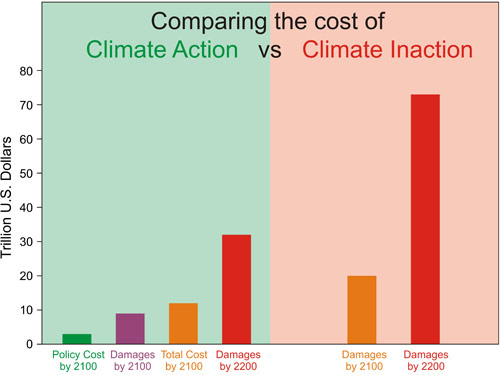
Figure 7: Approximate costs of climate action (green) and inaction (red) in 2100 and 2200. Sources: German Institute for Economic Research and Watkiss et al. 2005
This is why there is a consensus among economists with expertise in climate that we should put a price on carbon emissions (Figure 8).
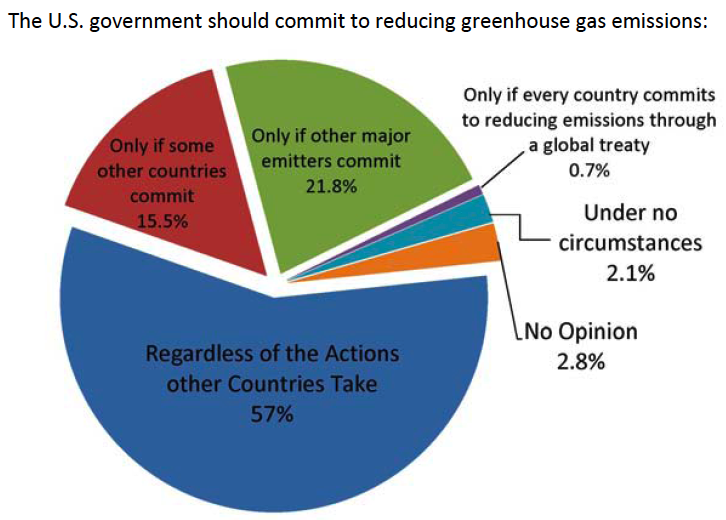
Figure 8: New York University survey results of economists with climate expertise when asked under what circumstances the USA should reduce its emissions
The Big Picture
The big picture is that we know the planet is warming, humans are causing it, there is a substantial risk to continuing on our current path, but we don't know exactly how large the risk is. However, uncertainty regarding the magnitude of the risk is not an excuse to ignore it. We also know that if we continue on a business-as-usual path, the risk of catastrophic consequences is very high. In fact, the larger the uncertainty, the greater the potential for the exceptionally high risk scenario to become reality. We need to continue to decrease the uncertainty, but it's also critical to acknowledge what we know and what questions have been resolved, and that taking no action is not an option. Th good news is that we know how to solve the problem, and that doing so will minimize the impact not only on the climate, but also on the economy.
The bottom line is that from every perspective - scientific, risk management, economic, etc. - there is no reason not to immeditately take serious action to mitigate climate change, and failing to do so would be exceptionally foolish.































 Arguments
Arguments





















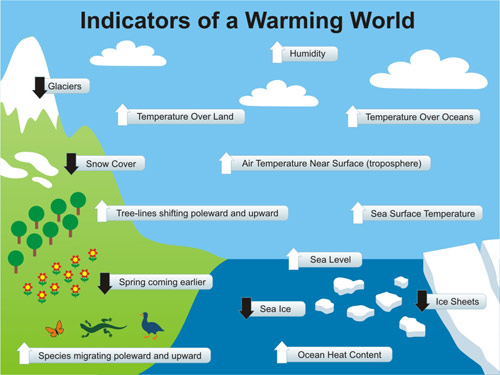
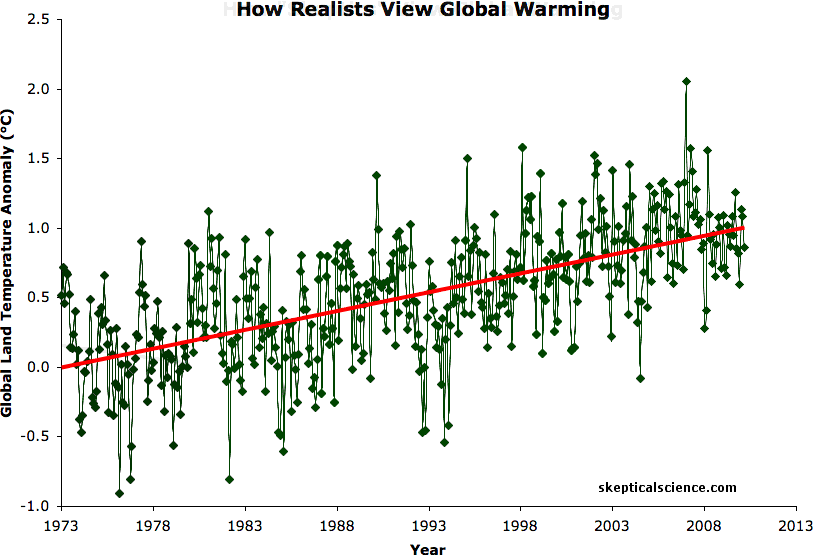
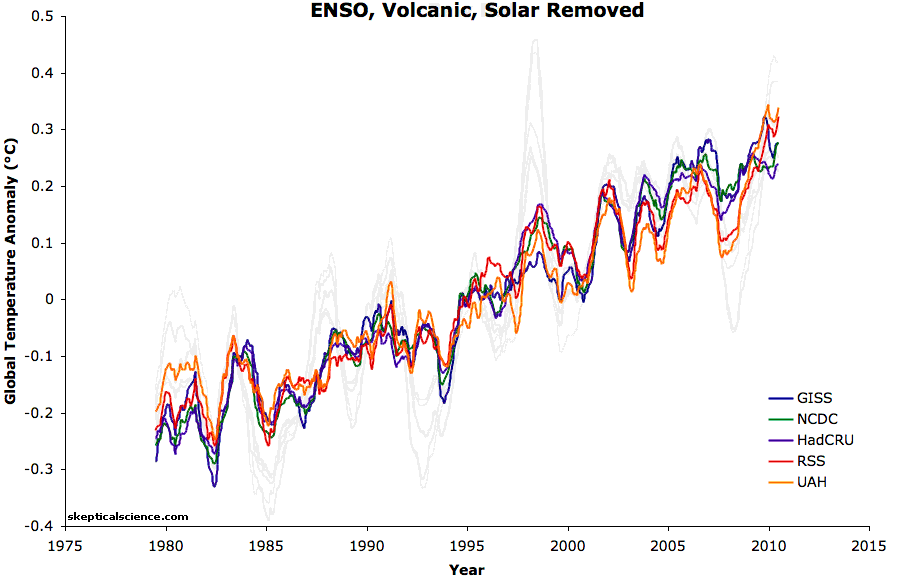

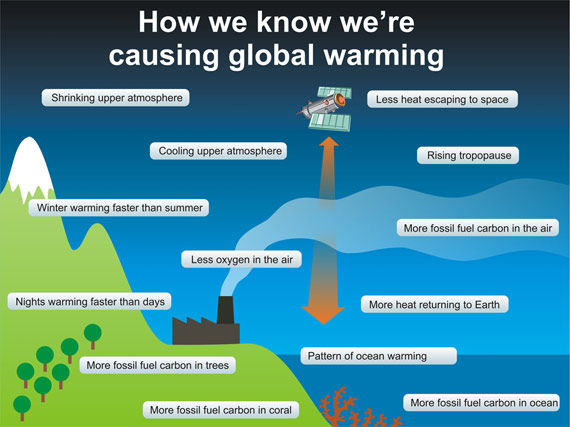









[DB] As Rob says below, it is better to relay on actual source material rather than just some blog. Data from the primary sources, placed in context, shows clear relationships between CO2 & temps difffering from the portrayals of your source:
[DB] Rather than promulgating fake-skeptic graphs from dubious blogs, use rather the scientific sites, like this one from NASA:
http://climate.nasa.gov/evidence/
[DB] "we need at least 50,000 years to see the signal emerge from the climate noise"
Um, no. That is the entire point of the Foster and Rahmstorf Measure the Global Warming Signal thread. A thread which you have already commented upon..
[DB] Please refrain from remarks about politics and ideology (snipped).
[dana1981] Oh yeah sorry, I just went ahead and made the suggested change. Probably should have made a note - it's been a busy day.
If you would like to continue detailed discussion of specific terminology in IPCC AR4, there are several topic-specific IPCC threads.
[DB] As previously noted, IPCC discussion is OT here. Please take this area of the discussion to the IPCC Reports: Science or Spin? thread.